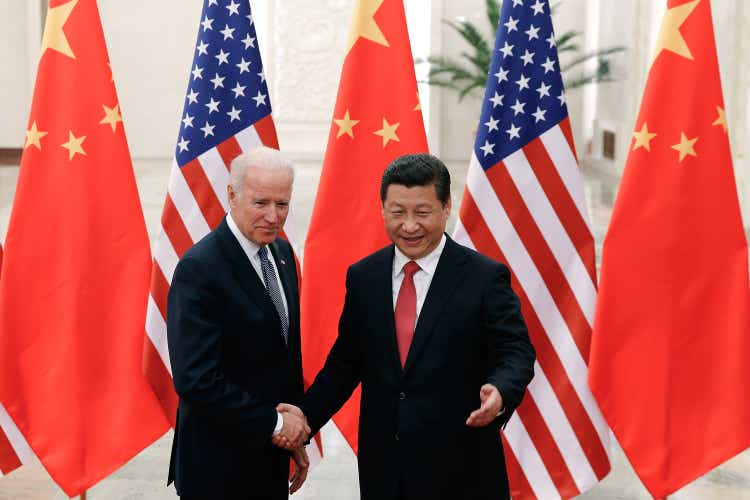Why are President Biden and Xi Jinping meeting?
It has been six years since Chinese President Xi Jinping set foot in the United States, visiting former President Donald Trump in Mar-a-Lago. Over recent years, the US-China relationship has grown worse. Biden and Xi plan to attend the Asia-Pacific Economic Cooperation (APEC) summit in San Francisco this Wednesday in an attempt to restore their relationship by tackling the trade wars, which have spiraled into areas of technology, geopolitics, national security, and more.
Despite the end of China’s zero-COVID policy, the nation is experiencing slowing economic growth, a rise in unemployed youth, and its biggest fall in Chinese exports since the pandemic. China’s trade surplus plunged from $102.7B in July of 2022 to $80.6B for the same period in 2023, as posturing took a new form following U.S. House Speaker Nancy Pelosi’s visit to Taiwan. The visit resulted in Beijing retaliating by cutting off major communication channels with the U.S. Spokeswoman at China’s foreign ministry, Hua Chunying, declaring, “The U.S. will certainly shoulder the responsibility and pay the price for undermining China’s sovereignty and security interest.” With APEC kicking off this week in hopes of stronger US-Chinese relations for 2024, and despite Morgan Stanley’s warning against buying the dip in Chinese stocks, China’s EV demand soars, along with investment into semiconductors, offering potential upside for Chinese stocks over the next year, a great portfolio diversifier.
Why invest in Chinese stocks now?
Despite a downward spiral in relations between the U.S. and China and negative sentiment in the Chinese market, Chinese stocks can offer upside amid its slowing economy. Where global volatility and inflation are eating into revenue and profits, China’s market accounts for 29.89% of the MSCI Emerging Markets Index, which is modestly outperforming the MSCI USA Index over the last year, 10.80% versus 10.08% (as of 10/31/23), and the net returns of China’s MSCI Index is outperforming the net returns of MSCI Emerging Markets and MSCI ACWI for the same period.
Offering diversification and an opportunity to tap China’s 1.4 billion population, I’ve selected three China ADR stocks rated strong buys, with strong Factor Grades, which rate investment characteristics on a sector-relative basis.
3 Chinese Stocks with Quant Strong Factor Grades
3 Chinese Stocks with Quant Strong Factor Grades (SA Premium)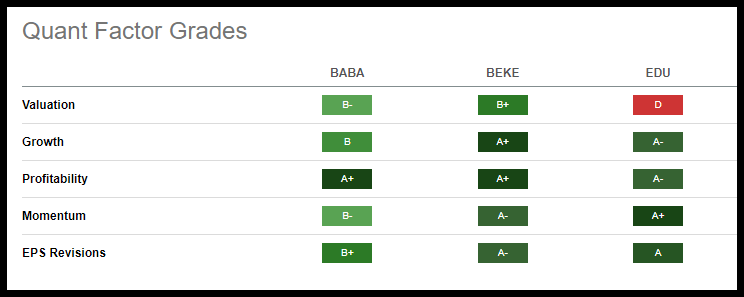
As one of the largest and fastest-growing economies in the world, China’s equities can offer attractive returns. Chinese equities experienced a surge in late 2022 as pandemic-related restrictions were lifted. Although some global investors fear Chinese stocks as some emerging-market portfolios strip China out of its funds, Chinese stocks still account for nearly 30% of the MSCI EM Index. Offering a strong Financial and IT focus, as the low-cost manufacturing model shifts gears toward innovative and transformative ideas in high-tech and growth opportunities, the second-largest economy is hard to ignore.
MSCI Emerging Markets Index Sector & Country Weights
MSCI Emerging Markets Index Sector & Country Weights (MSCI.com)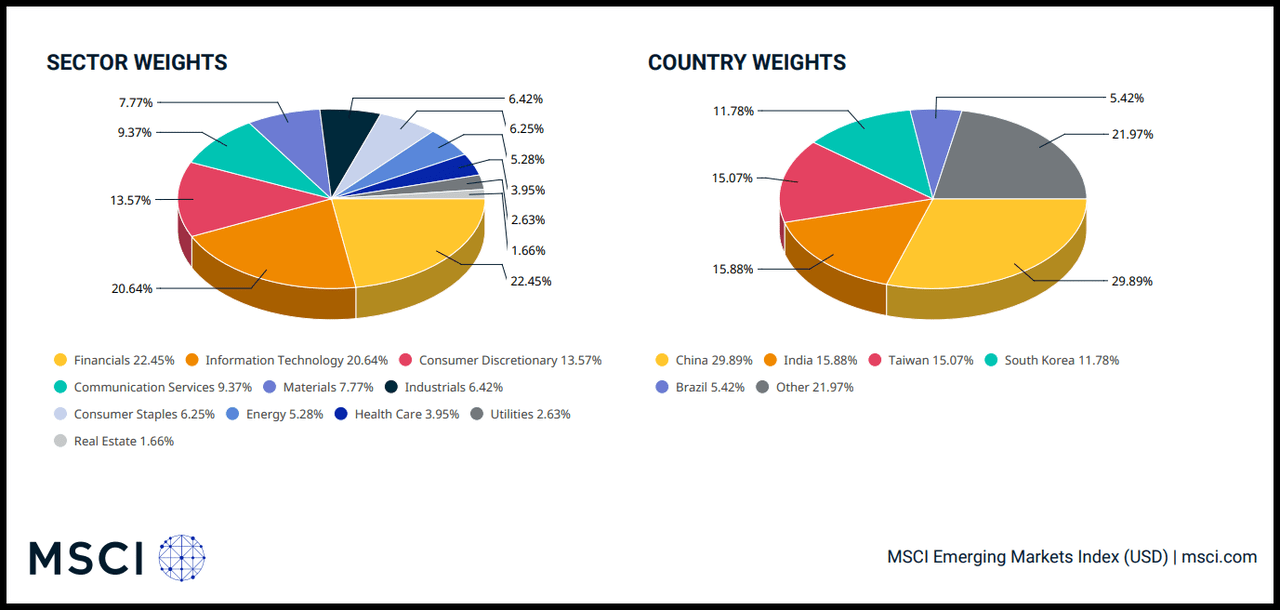
With more than $17 trillion in GDP, it is difficult to ignore the potential opportunity for the Chinese market. Some reasons to invest in China include:
-
Market Size
-
Growth Potential
-
Human Resources and Infrastructure
-
Innovation
-
Manufacturing
-
Emerging Industries
Although China’s Q3 GDP growth experienced a modest 4.9% expansion – a potential opportunity to capture the upside – in a statement, China’s statistics bureau said:
“The national economy continued to recover, and high-quality development was solidly advanced, laying a solid foundation to attain the annual development goals. We must also note that the external environment is becoming more complex and severe, domestic demand is still insufficient, and the foundation for economic recovery still needs to be consolidated.”
China vs U.S. Year-over-Year GDP Change (IMP, Bloomberg)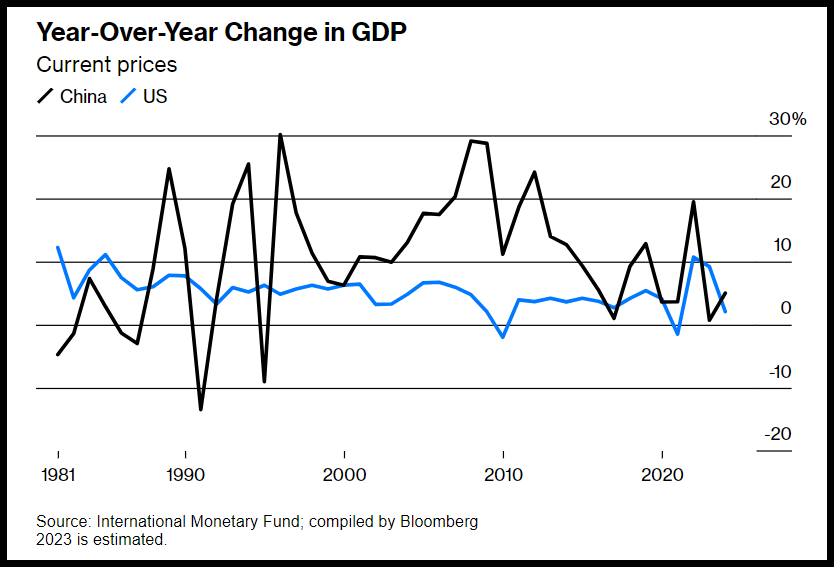
Despite the US and China emerging triumphantly from the COVID-19 recession, receding inflation with hopes of a soft landing may or may not complement the APEC meeting. As China continues to dominate the electric vehicle and semiconductor markets, as Wendy Cutler, former US trade negotiator, says, ” I don’t think there’s any evidence that the administration is somehow softening their actions towards China.” Although the overarching US-China relationship is based on economics, as the San Francisco meeting approaches, Biden and Xi’s efforts at stabilizing their relationship and the market’s interpretation remain to be seen, which is why there are risks to consider when investing in China ADRs.
Risks of Investing in China
As of 2021, fears of delisting Chinese stocks on the US stock exchange have become more of a reality, as China’s number of delisted stocks has reached 2022 highs. COVID lockdowns have come and gone, resulting in major global economic impacts, but regulatory and geopolitical risks are ever-present. With China as a communist nation, ESG risks and fear of government manipulation or wanting more control over businesses, thus curbing monetization and limiting user data collection, pose concerns. Where Biden and Xi are meeting to forge a path forward, if history is any indication, differing opinions may result in market volatility.
Tighter monetary policy has allowed the U.S. dollar to maintain its relative strength against global currencies, conversely hurting foreign-denominated securities. Although risks are associated with investing in Chinese stocks, many opportunities exist for investors wanting to diversify their portfolios, investing in stocks in one of the fastest-growing economies in the world. Chinese stocks may be gearing up for a rally following the APEC summit.
My Top Chinese Stocks
The cumulative outflow of foreign investors from Chinese stocks from August 7th through October 19th was $22.1B, the largest in Stock Connect’s history.
Investor Outflows From Chinese Stocks (Bloomberg)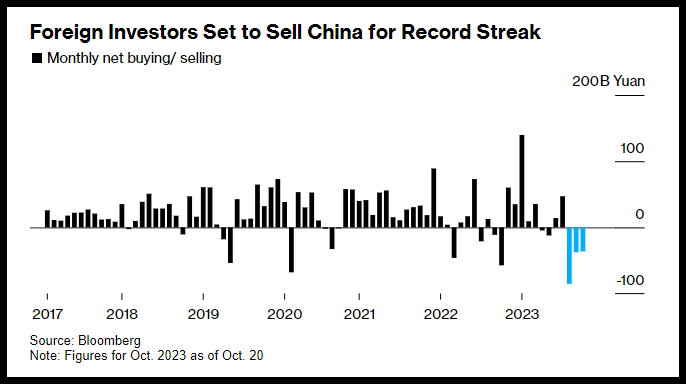
As one of the longest selling streaks, a third month of investor outflows from Chinese stocks, the meeting between President Biden and President Xi Jinping is overdue. Chinese stocks offer the diversification, many have strong fundamentals with the benefits of one of the biggest and fastest-growing economies. Known for advanced tech industries and varying products and services, Chinese stocks may be a worthwhile consideration for a portfolio, which is why I’ve selected the three stocks below using my quant-rating system. In assessing the universe of Chinese ADR stocks, the stocks in this article possess some of the strongest quant ratings and investment fundamentals. They possess solid combinations of collective metrics, including growth, momentum, and EPS revisions.
1. Alibaba Group Holding Limited (BABA)
-
Market Capitalization: $210.47B
-
Quant Rating: Strong Buy
-
Quant Sector Ranking (as of 11/14/23): 15 out of 535
-
Quant Industry Ranking (as of 11/14/23): 1 out of 31
Amazon’s (AMZN) rival, the e-commerce giant and Big Data conglomerate Alibaba Group offers technology infrastructure and marketing platforms for business segments, including retail and wholesale. Despite falling 8% YTD and facing macro and geopolitical headwinds, BABA is up more than 18% over the last year while trading at a discount. BABA’s valuation grade is B-, supported by a forward P/E ratio of 9.2x versus the sector’s 14.06x and a forward PEG ratio of 64%.
BABA Stock Valuation (SA Premium)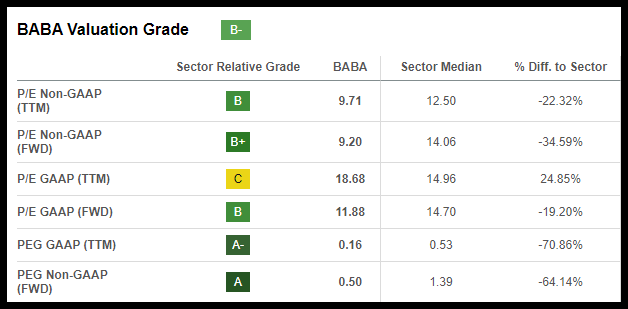
Despite increasing competition, BABA’s network and consumer base are strong. Cost-cutting measures, consecutive earnings beats, margin expansion, and investment in artificial intelligence have aided the latest earnings results. Q1 2023 EPS of $2.41 beat by $0.38 and revenue of $32.45B beat by $1.25B. Direct sales and revenue increased by 21% due to increased profits from its customer management service. BABA’s Digital Commerce Group experienced revenue increases of 41%, and with a new CEO with a “customers-first” approach, this Chinese stock is primed for upside.
2. New Oriental Education & Technology Group Inc. (EDU)
-
Market Capitalization: $11.23B
-
Quant Rating: Strong Buy
-
Quant Sector Ranking (as of 11/14/23): 2 out of 535
-
Quant Industry Ranking (as of 11/14/23): 1 out of 27
Offering educational services and test preparation, New Oriental Education & Technology Group’s exceptional revenue growth and margin expansion make it a top Chinese stock consideration for portfolios. The stock has rallied +170% over the last year, and although it trades at a premium, as highlighted by its ‘D’ valuation grade, EDU crushed Q1 2023 earnings.
EDU Stock Revisions Grade (SA Premium)
EPS of $1.13 beat by $0.33 and revenue of $1.10B beat by nearly 48% year-over-year. In addition to higher operating profit margins, given positive operating leverage and falls in general and administrative expenses, EDU anticipates its overseas business and consulting to grow at 12% CAGR through 2028. In addition to strong profitability and top-and-bottom-line earnings beats, 11 analysts revised FY1 estimates upward over the last 90 days.
“We have launched several new initiatives which mostly revolve around facilitating students all around development. I’m pleased to share that these initiatives have continued to exceed our expectations by yielding consistent growth and meaningful profit to the company,” said Stephen Yang, New Oriental Executive President and CFO.
3. KE Holdings Inc. (BEKE)
-
Market Capitalization: $18.39B
-
Quant Rating: Strong Buy
-
Quant Sector Ranking (as of 11/14/23): 1 out of 175
-
Quant Industry Ranking (as of 11/14/23): 1 out of 21
China’s real estate market, which accounted for nearly 30% of its economy, has suffered major blows. A housing boom as a result of an ever-growing population and urbanization came tumbling down as the pandemic wreaked havoc, followed by a government-led clampdown on borrowing, causing prices to fall, decreases in transactions, and property slump all around. But KE Holdings Inc., through its subsidiaries, is a real estate operator and integrator that has been resilient. Driven by a powerful online database and infrastructure that integrates its online traffic with offline stores and engineering work, BEKE’s digital capabilities offer an incredible platform for its users that has translated to consecutive top-and-bottom-line earnings beats and ten upward analyst revisions in the last 90 days.
BEKE Stock Revisions (SA Premium)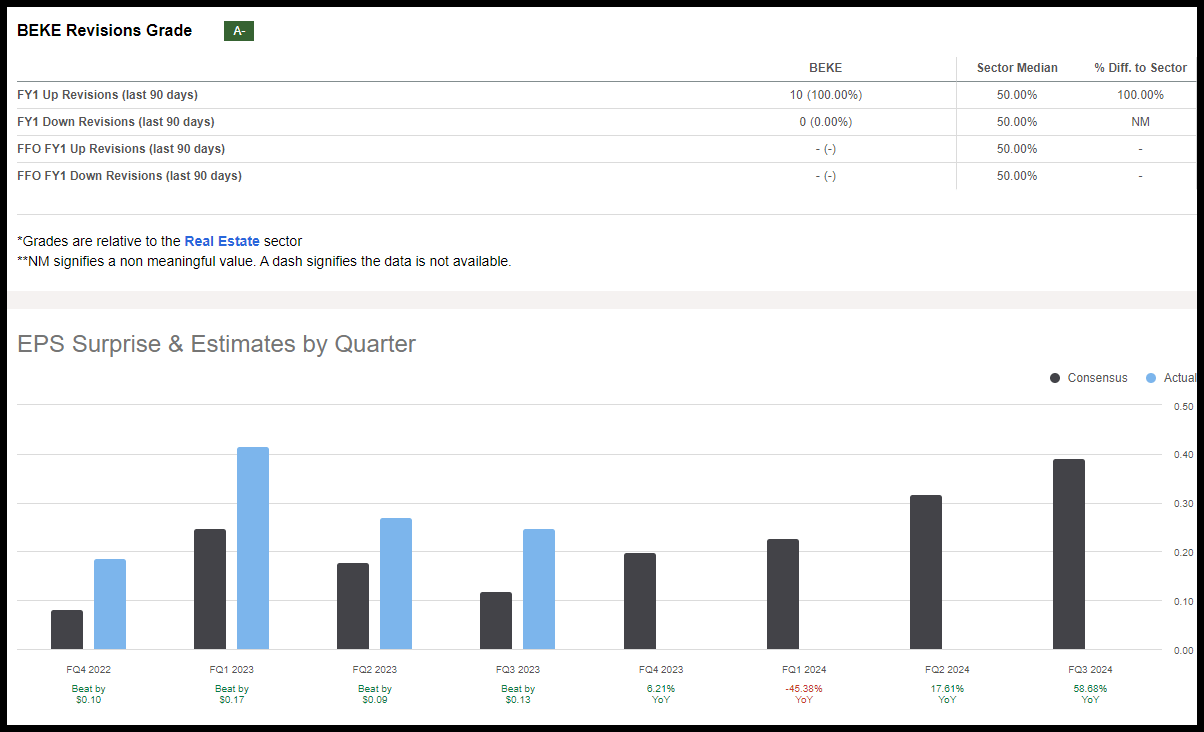
Third quarter EPS of $0.25 beat by $0.13 and revenue of $2.45B beat by $76.12M. For Q3, its home renovation and furnishings business saw an increase of 66% Y/Y, and its property management services grew from 50,000 units in Q3 of 2022 to 160,000 this year. As China’s real estate market recovers, during the Q3 Earnings call, KE Holdings CFO Tao Xu stated:
“Since the end of August, a wave of supportive policies has been rolled out with many cities take steps to modify the criteria of first-time home buyer qualifications, lower down payment ratios cut market interest rates and relaxed purchase restrictions. Market sentiment notably improved with transaction substantially rebounding since September.”
Facing macro and geopolitical headwinds, BEKE’s stock price fell, and YTD is modestly up 2% and +8% over the last year, posing a buy-the-dip opportunity. While the stock is trading near its 52-week low and possesses a discounted valuation, its forward P/E ratio is 13.61x versus the sector’s 34.14x, a 60% discount. With strong Total Debt/Capital (TTM) nearly a 20% discount to the sector, good operation cash flow, and bullish momentum consider this stock for a portfolio whose growth prospects and focus on performing well in a challenging capital market environment may prove fruitful.
Should I buy Chinese stocks?
China’s economy has transformed from “the world’s factory” with low labor costs and a strong business ecosystem to that of an innovator focused on tech and high-growth sectors. While risks are present when investing in China, the benefits of portfolio diversification and investment into one of the largest and fastest-growing economies with the largest population ready for consumption offer a great risk-reward opportunity.
The three Chinese stocks with strong buy ratings are justified based on their fundamentals and quant ratings. Avoiding Chinese stocks altogether may be a serious oversight as it is a large asset class. In the long term, diversification minimizes risk and maximizes returns. China is the second-largest economy with the largest population in the world. From a pure market perspective and weighing risk to reward, it’s important to consider Chinese stocks as a diversification strategy. With the Biden-Xi meeting this week, investing in Chinese stocks that are fundamentally strong companies with excellent profitability, solid valuation frameworks, and growth prospects can prove lucrative. Consider some of Seeking Alpha’s Top Rated Stocks if you’re uncomfortable with international or Chinese stocks, or if you prefer a list of our top monthly suggestions from among the best of the best strong buy quant stocks, consider Alpha Picks. The key is to make well-informed investment decisions, using tools that help take the emotion and fear out of investing.
Editor’s Note: This article discusses one or more securities that do not trade on a major U.S. exchange. Please be aware of the risks associated with these stocks.
Read the full article here


